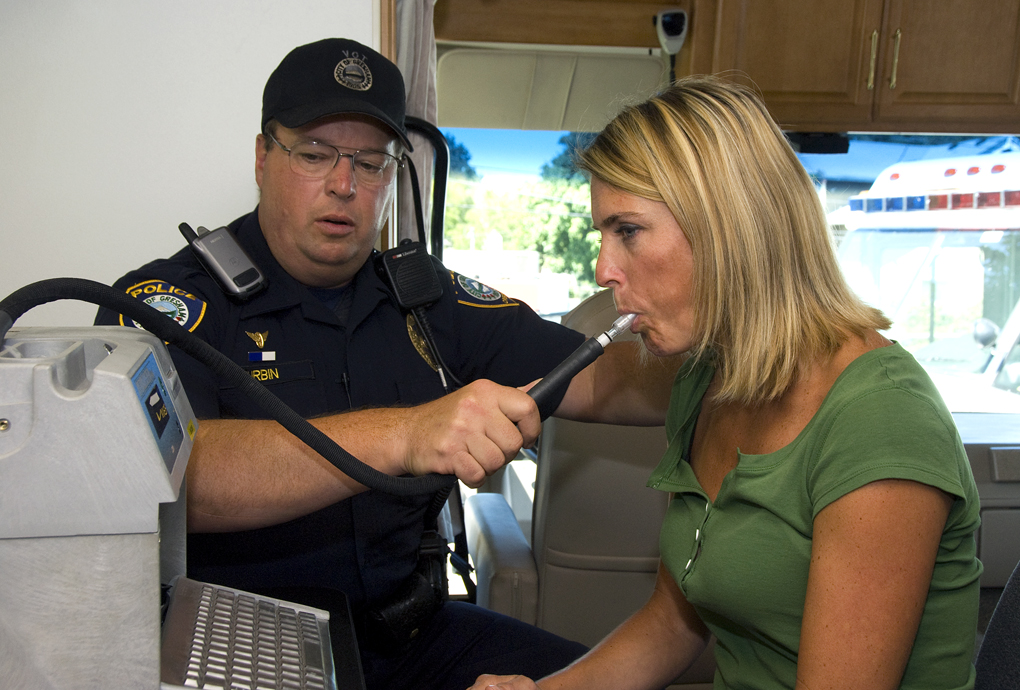In Oklahoma, being pulled over on suspicion of driving under the influence (DUI) is a situation no one wants to face. Yet, it happens more often than you’d think. One question that frequently arises is whether you can refuse to take a field sobriety test or a breathalyzer in Oklahoma when stopped by law enforcement.
Let’s go over the legal implications of refusing these tests and what it could mean for you.
Field Sobriety Test vs. Breathalyzer in Oklahoma
Field sobriety tests are physical tasks administered by an officer to assess whether you’re impaired. These can include the Horizontal Gaze Nystagmus (i.e. following a light or pen with your eyes), the Walk-and-Turn test, and the One-Leg Stand test.
Breathalyzer tests, on the other hand, measure your blood alcohol concentration (BAC) by analyzing a breath sample. In Oklahoma, a BAC of 0.08% or higher typically constitutes legal intoxication.
Can You Refuse a Field Sobriety Test?
Yes, you can refuse to perform field sobriety tests in Oklahoma—these tests are voluntary, and there’s no legal penalty for declining them. Still, field sobriety tests are highly subjective and often unreliable. Officers may use them to gather evidence against you, and even sober individuals can struggle with these tests due to nervousness, medical conditions, or environmental factors.
However, refusing to take these tests may raise suspicions, and the officer might decide to arrest you based on other observations, such as erratic driving or the smell of alcohol. But that’s just the truth—field sobriety tests are a tool for law enforcement, not a requirement for drivers.
Can You Refuse a Breathalyzer Test?
When it comes to breathalyzer tests, the situation is more complicated. Oklahoma operates under an implied consent law. This means that by obtaining a driver’s license, you’ve implicitly agreed to submit to chemical tests (breath, blood, or urine) if lawfully arrested for DUI.
Refusing a breathalyzer test after an arrest can result in automatic penalties, including the suspension of your driver’s license. For a first refusal, your license can be revoked for six months. Subsequent refusals can lead to even longer suspensions—up to three years—and the requirement to install an ignition interlock device once your driving privileges are restored.
Unsurprisingly, Oklahoma’s penalties for refusing a breathalyzer are designed to encourage compliance. Law enforcement can still arrest you based on probable cause, and prosecutors may use your refusal against you in court as evidence of guilt.
That’s right—your refusal can be introduced as an admission of intoxication.
Potential Consequences Under Implied Consent Laws
Under the implied consent laws, refusing a breathalyzer test triggers administrative penalties separate from any criminal DUI charges.
Here’s what you might face:
- License Suspension: As mentioned, your driver’s license can be suspended for six months to three years, depending on prior refusals or DUI convictions.
- Ignition Interlock Device: You may be required to install this device at your own expense, which prevents your vehicle from starting if it detects alcohol on your breath.
- SR-22 Insurance: You’ll likely need to obtain SR-22 insurance, a certificate of financial responsibility that comes with higher premiums.
- Use of Refusal in Court: Prosecutors can argue that your refusal indicates consciousness of guilt, potentially swaying a jury against you.
Refusing a breathalyzer doesn’t guarantee you won’t be convicted of a DUI. Officers can obtain a warrant for a blood test, especially if there was an accident involving injury or death.
Differences Between Refusing Breathalyzers vs. Sobriety Tests
To recap, refusing field sobriety tests carries fewer immediate consequences compared to refusing a breathalyzer test. Field sobriety tests are voluntary, and there’s no license suspension for declining them. Breathalyzer tests, however, fall under implied consent laws, and refusal leads to automatic administrative penalties.
But here’s the kicker: refusing either test doesn’t necessarily prevent a DUI arrest or conviction. Officers can rely on other evidence, such as your driving behavior, physical appearance, and statements made during the stop.
What Should You Do if Stopped for a Suspected DUI?
Navigating a DUI stop is tricky, and your actions can significantly impact the outcome. Here’s some legal advice:
- Remain Calm and Polite: Arguing with the officer won’t help your case. Stay calm, be respectful, and keep your hands visible.
- Know Your Rights: You have the right to remain silent beyond providing basic identification and vehicle documentation.
- Field Sobriety Tests: You can politely decline field sobriety tests. Simply say, “I respectfully decline to perform any field sobriety tests.”
- Breathalyzer Tests: Understand that refusing a breathalyzer test will result in automatic license suspension and can be used against you in court. Weigh the immediate penalties against the potential evidence the test might provide.
- Ask for an Attorney: If arrested, assert your right to legal counsel immediately.
Get Overman Legal in Your Corner
If you’re facing DUI charges in Oklahoma, time is of the essence. DUI cases are complex, and the consequences can be severe, including jail time, hefty fines, and long-term impacts on your driving record and insurance rates.
Don’t leave your future to chance or ineffective counsel. At Overman Legal, our experienced attorneys specialize in DUI defense and are well-versed in Oklahoma’s traffic laws and regulations. We will meticulously examine every detail of your case—from the legality of the traffic stop to the administration of tests—to build a robust defense on your behalf.
We understand that good people can find themselves in tough situations. Our team is committed to fighting for your rights and achieving the best possible outcome so you can move forward with your life.
The sooner you contact us, the better your chances of a more favorable outcome.




